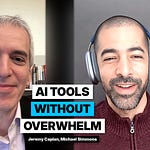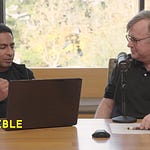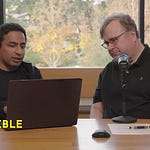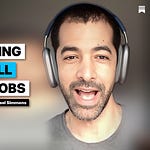Video Clip Source: Tim Ferriss: How to Learn Better & Create Your Best Future | Huberman Lab Podcast
Personal Note
There are a million things I could’ve written about today.
But, I chose to write about timing.
I’m fascinated by the topic for a few reasons:
I am realizing that timing is more important than I thought.
There are almost no resources on becoming better at the skill of timing.
I realized that my thinking on the topic was black-and-white rather than dialectical. By focusing only on the timeless, I was missing opportunities to synthesize the timeless with the timely and get the best of both worlds.
I realized I had an internal resistance to “chasing trends” that I wanted to work through.
What You Get In Today’s Post
Free subscribers
Get the first two direct takeaways from the clip:
Deciding when to stop is just as important as deciding when to start
The Ferris Bestseller Hack helps you find what works today
Paid subscribers
In addition, get four other deeper takeaways and resources that synthesize the clip with my own experiences and research:
Identify the areas of your career where you want to improve your timing. Collect 12 different areas where you can apply the skill of timing in your personal and professional life.
Collect psychoactive questions that extract amazing insights from top performers. Get Ferriss’ top 17 questions he has ever collected.
Be a second mover, not a first mover. Get more precise about when exactly to adopt a trend.
Work through your internal resistance to “trend-chasing.” Often, the largest challenge to learning a skill is emotional, not cognitive.
In Ferriss Formula: How To Write Blockbusters That Predict The Future, I shared a fascinating and extremely practical Tim Ferriss interview clip. In it, he shares two big ideas:
Timing is incredibly important for success.
There are four easy things you can do to quickly get better at timing (that almost no one does).
Tim Ferriss’ career is the perfect case study for the power of these ideas. For example, consider these career-defining trends that he timed perfectly:
Blogging (started a massively successful blog in 2006 during the heyday of blogs.)
Angel investing (was super early to Uber, Facebook, TaskRabbit, Twitter, Shopify, and Duolingo in 2007. Stopped in 2015 when things became frothy.)
Book Publishing (was early on lifestyle hacking with the 4-Hour Work Week and early on body hacking with the 4-Hour Body.)
Podcasting (started his massively successful podcast in 2015, just as podcasts took off.)
The overall takeaway is this…
Success is not just about quality; it’s about timing.
Tim Ferriss is not alone in noticing this.
In Study From Legendary Investor: Timing Is The #1 Hidden Reason Why Startups Succeed, I share the results of fascinating research on what caused the amazing investing results behind one of the most successful business incubators ever.
Even the incubator's founder, Bill Gross, was shocked by the results. Timing was way more important than any other factor…

Tim Ferriss’ and Bill Gross’ careers point to the importance of timing for success. Yet…
The topic of timing is almost never talked about. There aren’t any classes or books on the topic. It’s a bizarre hole in the literature.
This is why I particularly loved Ferriss’ extremely practical, step-by-step breakdown in the Ferriss Formula. Ultimately, his approach comes down to just four things, which I break down in that post:
Find holes in mainstream thinking with three words
Look for three types of weak signals of future breakthroughs
Look for hidden innovations, which are new, old, or orphaned
Ask experts these four questions to uncover their unspoken secrets
In today’s clip, Ferriss adds more texture to the topic. Below are my top takeaways…
6 Life-Changing And Practical Tips To Perfectly Time The Next Big Thing
1: Deciding when to stop is just as important as deciding when to start
I will say that I’m pretty good at finding uncrowded playing fields. And that was true with angel investing when I started in the Valley. Certainly you didn't really have micro VCs. You didn't have, like the Tiger Global, starting to come down and invest in earlier rounds. You didn't have that type of bottom up and top down pressure and saturation.
And as soon as that started to happen, then I stepped out in 2015 or so, once the time sheets and so on started looking pretty nutty to me. I stopped for quite a while, and not coincidentally, that is when I started focusing on the podcast.
—Tim Ferriss
Whenever you find yourself on the side of the majority, it is time to pause and reflect.
— Mark Twain
I admire that Ferriss was able to stop investing when the market was most frothy. It’s easier said than done to buy low and sell high. Most people do the opposite because they follow the herd.
It’s also interesting that with the time that he freed up, he was able to start a new project, his podcast, which is now the #1 thing he is known for.
Ferriss approach of knowing when NOT to invest reminds me of Warren Buffett. Buffett has famously stayed on the sidelines for many years with tens of billions of dollars during boom times. During these periods, many headlines proclaimed that Buffett had lost his Midas touch. Many even called him a dinosaur when he sat out the dotcom boom.
Takeaway: Timing isn’t just about buying low; it’s about selling high when the market is overcrowded and everyone is jumping in.
Reflection Question: What are industries, skills, asset classes, marketing channels, or other trends that are overcrowded and that you should stop participating in?
2: The Ferris Bestseller Hack helps you find what works today
I came across podcasting because for every book I launch, I look for the undercrowded, undervalued promotional platform or channel.
The process is very simple.
1. I talk to a handful of friends, or I reach out to strangers who have launched books in the last 12 months that have become massive bestsellers.
2. I ask them [for questions]:
- What performed much better than you expected in terms of driving book sales?
- What performed worse?
- What do you think is getting more important with time?
- What is getting less important and four hour work week?
—Tim Ferriss
What works in terms of marketing channels changes over time. At any given moment, you want to find marketing channels that work and are uncrowded.
To figure out what works now and is not crowded, Ferriss follows two steps:
He finds top performers with two qualities—Recently successful and massively successful.
He asks them four questions in order to extract which channels are undervalued and undercrowded:
What performed much better than you expected in terms of driving book sales?
What performed worse?
What do you think is getting more important with time?
What is getting less important?
Immediate Takeaway: If you want to promote ideas now, don’t just look for timeless marketing principles. Look for timely principles too. Therefore, learn from people who became successful because of timely principles.
Broader Takeaway: When I connect the immediate takeaway with my knowledge on learning how to learn, I also get a broader takeaway: who you study is one of the most important learning decisions you can make. Furthermore, there isn’t just one type of top performer you can study. Each of the following types will teach you a different lesson:
People who are repeatedly successful. Reduces the odds that the cause of their success is luck.
People who came out of nowhere and became successful. Reduces the odds that they became successful simply because they leveraged their brand or network.
People who are successful for a long period of time. Staying at the top is harder than getting to the top. Learning from people who have longevity is more likely to help you build infinite devotion.
People who are massively successful. Reduces the odds that the cause of their success is luck. Furthermore, the strategies to become massively successful are often different than those required to be slightly successful.
People who became successful fast. Learning from people who became successful fast will help you find shortcuts.
People who became successful recently. Helps you find timely techniques, principles, and tools.
Successful people who had to overcome significant disadvantages. In other words, I try to find people who use better toolkits or replicable strategies, not better genetics or other unreachable advantages.










